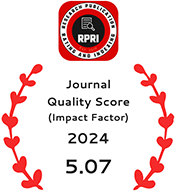Antibiotics Interaction with Dairy products - Exploring Health Impacts and Treatment Consideration
DOI:
https://doi.org/10.55544/jrasb.3.4.1Keywords:
Antibiotics, Milk, Yogurt, Tetracycline, FluoroquinolonesAbstract
Antibiotics were recognized as naturally occurring substances produced by specific microorganisms with the capability to harm others. Dairy products such as milk, cheese, yogurt, and butter are carefully crafted to preserve the nutritional benefits of milk, highly valued worldwide for their nutritional richness, culinary versatility, and integral role in various dietary traditions. The interaction between antibiotics and dairy products is a critical consideration in clinical settings. This review examines the mechanisms underlying these interactions, emphasizing the impact of calcium on antibiotic bioavailability. Clinical implications are discussed, highlighting the importance of separating antibiotic administration from dairy consumption to optimize treatment outcomes.
Downloads
References
Lancet 2018; 392: 1684–735. Burstein R, Henry NJ, Collison ML, et al. Mapping 123 million neonatal, infant and child deaths between 2000 and 2017. Nature 2019; 574: 353–58.
Dicker D, Nguyen G, Abate D, et al. Global, regional, and national age-sex-specific mortality and life expectancy, 1950-2017: a systematic analysis for the Global Burden of Disease Study 2017.
Russell A. D. (2004). Types of antibiotics and synthetic antimicrobial agents. In: Denyer S. P., Hodges N. A. & German S. P. (eds.) Hugo and Russells pharmaceutical microbiology. 7th Ed. Blackwell Science, UK. Pp. 152-186.
Dicker D, Nguyen G, Abate D, et al. Global, regional, and national age-sex-specific mortality and life expectancy, 1950-2017: a systematic analysis for the Global Burden of Disease Study 2017.
Dairy Farming, News & Stories | U.S. Dairy [Internet]. Dairy Products & Foods; [cited 2024 Jul 20]. Available from: https://www.usdairy.com/dairy-nutrition/products
Sapadin AN, Fleischmajer R. Tetracyclines: nonantibiotic properties and their clinical implications. J Am Acad Dermatol. 2006 Feb;54(2):258-65.
Nelson ML, Levy SB. The history of the tetracyclines. Ann N Y Acad Sci. 2011 Dec;1241:17-32.
Pallett AP, Smyth EG. Clinicians' guide to antibiotics. Tetracycline. Br J Hosp Med. 1988 Nov;40(5):385-90.
Valentín S, Morales A, Sánchez JL, Rivera A. Safety and efficacy of doxycycline in the treatment of rosacea. Clin Cosmet Investig Dermatol. 2009 Aug 12;2:129-40.
Martindale: The Complete Drug Reference, 35th Edition. 3rd ed. Pharmaceutical Press; 2006. 2800 pg.
Wood JH & Shannonhouse WR: Milk inactivation of tetracycline. Drug Intell Clin Pharm 1977; 11:495.
Welling PG, Koch PA, Lau CC et al: Bioavailability of tetracycline and doxycycline in fasted and nonfasted subjects. Antimicrob Agents Chemother 1977; 11:462-469.
Zimmerman HJ. Quinolones In: Hepatotoxicity: The Adverse Effects of Drugs and Other Chemicals on the Liver (2nd ed). Philadelphia, PA: Lippincott; 1999. pg.no :603.
Walters JD, Zhang F, Nakkula RJ. Mechanisms of fluoroquinolone transport by human neutrophils. Antimicrobial agents and chemotherapy. 1999 Nov 1;43(11):2710-5.
Cozzarelli NR. DNA gyrase and the supercoiling of DNA. Science 1980;207:953–60.
Appelbaum PC, Hunter PA. The fluoroquinolone antibacterials: Past, present and future perspectives. Int J Antimicrob Agents. 2000;16:5-15.
Patrick GL. Antibacterial agents In: An Introduction to Medicinal Chemistry. Oxford, New York: Oxford University Press; 2003. p. :379-435.
De Almeida MV, Saraiva MF, De Souza MV, Da Costa CF, Vincente FR, Lourenco MC. Synthesis and antitubercular activity of lipophilic moxifloxacin and gatifloxacin derivatives. Bioorg Med Chem Lett. 2007;17:5661-4.
Frost RW, Carlson JD, Dietz AJ et al: Ciprofloxacin pharmacokinetics after a standard or high-fat/high-calcium breakfast. J Clin Pharmacol 1989; 29:953-955.
Neuvonen PJ, Kivisto KT & Lehto P: Interference of dairy products with the absorption of ciprofloxacin. Clin Pharmacol Ther 1991; 50:498-502.
Radandt JM, Marchbanks CR & Dudley MN: Interactions of fluoroquinolones with other drugs: mechanisms, variability, clinical significance, and management. Clin Infect Dis 1992; 14:272-284.
Downloads
Published
How to Cite
Issue
Section
License
Copyright (c) 2024 M. Barvin Subkisha, J. Christy Immaculate, B. S. Janani, E. Lavanya

This work is licensed under a Creative Commons Attribution-NonCommercial-NoDerivatives 4.0 International License.


















